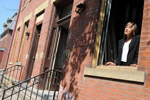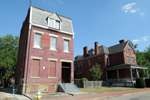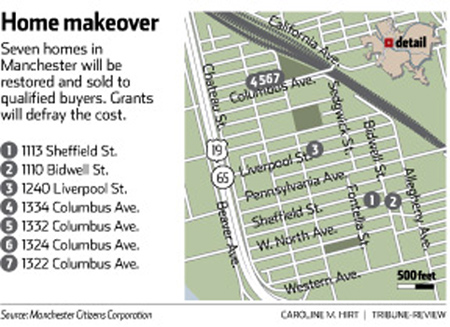
7 Homebuyers Sold on Manchester Vision
By Adam Brandolph
PITTSBURGH TRIBUNE-REVIEW
Thursday, September 2, 2010

Linda Nelson, chairwoman of the Manchester Citizens Corporation, inspects one of the properties being restored on Columbus Avenue in Manchester. The home was purchased as part of the Great House Sale. Jasmine Goldband | Tribune-Review
For the first time in years, Anthony Clark sees a reason to invest in his North Side neighborhood.
“Manchester is really starting to get going, and after 15 years of renting, I think it’s a good time,” said Clark, 44. “I think we’re about to see some really great things.”
For years, the city demolished vacant homes in Manchester, turning usable buildings into weed-filled lots that became overrun with graffiti and trash. The vacant lots made selling homes difficult, and people living there say the community suffered despite the fact that police records show the number of crimes fell by nearly half over the past decade.
“When you have a tooth out, the disease begins to spread,” said Linda Nelson, chairwoman of the Manchester Citizens Corporation, a community group founded in 1965 that helped spur more than $40 million in developments and initiatives. “If (buildings) come out, it’s definitely a hindrance. If we can renovate them, it’s a plus.”

An abandoned structure (left) on the 1100 block of Bidwell Street in Manchester is one of several slated for rehabilitation. Jasmine Goldband | Tribune-Review
With the group’s managing director Stanley Lowe urging the city to save buildings from demolition, the wrecking ball slowed. Along with the Pittsburgh History & Landmarks Foundation, it identified 110 buildings that should be saved, 63 of which are considered a priority.
Lowe said he reminded members of the city’s Historic Review Commission about the neighborhood’s rich architectural and cultural heritage, which helped Manchester achieve city and national historic status in 1979.
“Once you tear down the building, you can never go back,” Lowe said.
In October, the citizens’ group showcased seven homes to be restored by March. More than 100 people, some from as far away as Venezuela and Colombia, attended a two-day session that included a seminar educating them about how to buy one of the homes.
Twenty-five people put down $1,500 deposits, and seven qualified buyers were chosen at random to buy the homes. The rest were put on a waiting list for future restorations.
“The homes were a terrible mess,” Nelson said. “But the people who came in saw our vision.”
The cost to restore each home will range from $150,000 and $450,000, but they will sell for $90,000 to $200,000.
Incentives totaling $2 million for the buyers will be paid by grants from the city’s Urban Redevelopment Authority, the federal Department of Housing and Urban Development, Allegheny County, the Pittsburgh History & Landmarks Foundation’s Landmarks Community Capital Corporation and the Allegheny Foundation.
City Councilman R. Daniel Lavelle, whose district includes Manchester, said the strategy “fits the city’s economic reality.”
“The city can’t afford to do it all at once, so (the citizens’ group has) identified key properties they want to save,” Lavelle said. “I think it’s a tremendous project.”
Preserving the “architectural fabric” of the historic district has been ongoing since the 1970s, said Arthur Ziegler, president of the landmarks foundation.
Rob Stephany, executive director of the redevelopment authority, said the restorations are a “really bright strategy,” especially because they’re near construction at Columbus Square, a $15 million, 31-home development on four acres.
“Manchester has everything working for it,” he said.

